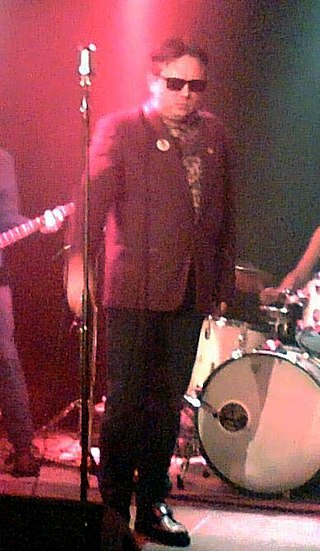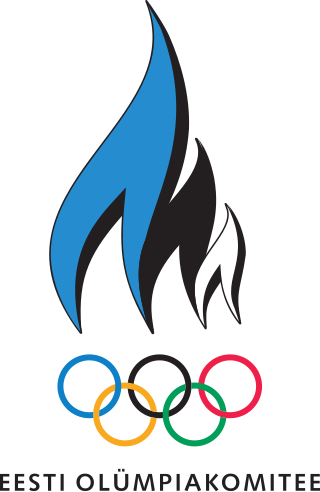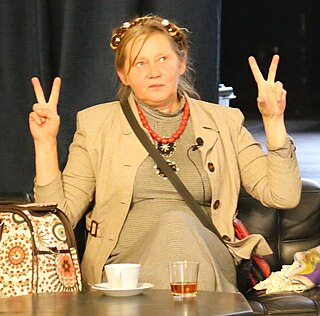This article has multiple issues. Please help improve it or discuss these issues on the talk page . (Learn how and when to remove these template messages)
|
Estonian punk is a punk movement in Estonia, part of the international punk subculture.
This article has multiple issues. Please help improve it or discuss these issues on the talk page . (Learn how and when to remove these template messages)
|
Estonian punk is a punk movement in Estonia, part of the international punk subculture.
Punk first developed in Estonia in the 1970s. Aleksander Müller, Irwin Art, Mihkel Pilve and Richard Noolt were among the first Estonian punks. As punk as a subculture is ideologically against social norms, power and mass culture, the main target of the criticism of the Estonian punk was the Soviet order. Although youth rebellion was usually limited to defiant behavior and graffiti, there were also convinced anarchists and freedom fighters, such as Hillar Mardo, among the punks. The punks at that time were mostly of one generation, born in 1960–1965.
Due to the publication of beliefs, punks had a lot of problems. At the same time, punk was a way out for young people who were in trouble with the law or their parents. Basically, punks could be recognized by their far-reaching clothing. Punk was a revolt against a totalitarian state and a one-man mass culture. The driving force behind the punk was anarchism, the spread of which was hindered by the state and its established laws as factors restricting freedom.
Music was an important part of punk culture. In Estonia, punk rock - a style of music that grew out of rock 'n' roll - spread, dividing into several styles. In the West, punk jazz and punkabilly also existed. Punk music had simplicity. It was characterized by fast tempo (at least 140 beats per minute), strong amplification, a markedly aggressive playing style and sharp and straightforward lyrics.
Although many punks only listened to this music, a number of bands were born in the Estonian punk movement. Most of the punk bands were limited to a maximum of one concert in their hometown and then disappeared permanently, with few performing longer. As Tallinn was the capital and largest city of the Estonian SSR, most of the punk bands operated there.
In December 1979, the Tallinn punk band The Rebels was formed: Artur Poland - vocals, guitar; Ahto Moses - drums; Urmas Tangsoo - bass.
The band Cheese and the Tallinn 10th Secondary School band Sex Telegramm also appeared in Tallinn, where Toomas Pertelov, Jaak Männil and others played.
The Pära Trust - Jaak Arro, Veljo Vingissaar, Jüri Kermik and Hardi Volmer - emerged in the same year, the bands Kaseke and Singer Vinger, which developed later, have received opposite evaluations. Sometimes they have been considered important influences on Estonian punk. According to other sources, Pära Trust, Kaseke and Singer Vinger were not punk bands themselves, but inspired punk bands like Cheese.
Along with perestroika, alternative movements became more active. Punks gathered in front of cafes in Tallinn. The youth could be detained by the militia in 1988, for clothing deemed "unsuitable" for a Soviet citizen, and there was also a risk of being beaten.
Later they gathered in gangs and spent time on the street together. There were fights with supporters of disco music or other opposing gangs. Ljubers, young people named after the Moscow suburb Ljubertsy and with a violent reputation, also visited Estonia once, but the fight did not stop. To evade the Soviet army, punks sometimes let themselves go crazy, pretending to be mentally disturbed. Various views spread: sexual freedom, pacifism and anarchism. The poles of the punk system of that time were anarchist philosophers and the lumpen proletariat.
Estonian punks of the time included Richard Nool, Mikk Pilv, Ülari Ollik, Villu Tamme, Tõnu Trubetsky, Anti Pathique (:et), Ivo Uukivi, Merle Jääger and Siiri Sisask.
In the 1990s, freedom of expression and activity came. Former cellar bands J.M.K.E. and Vennaskond performed on foreign tours. During the recession of 1993-1994 and its aftermath, café culture disappeared. New subcultures spread among young people.
The punks of the old generation meet mainly at music events, and a new generation of punk has grown up. Today, punks oppose capitalism, Nazism and racist skinheads, among others. Since the 2000s, major punk music events have become popular in Estonia, such as a punk festival in Rakvere. The oldest and largest punk, ska and hardcore festival in Estonia is Punk'n'Roll, which has been taking place since 1998.
Anarcho-punk is an ideological subgenre of punk rock that promotes anarchism. Some use the term broadly to refer to any punk music with anarchist lyrical content, which may figure in crust punk, hardcore punk, folk punk, and other styles.
The Estonian rock music scene saw its beginnings in the mid-1960s during Nikita Khrushchev's thaw in the Soviet Union and the rise of British bands all over the world. The first Estonian rock-groups were primarily high school bands playing cover versions of the current UK Top 10. Despite the lack of official support from Soviet authorities some of these groups, posing as dance music bands in various clubs, gained a large underground following. Some groups managed to make proper studio recordings and appear a couple of times on television.

Tõnu Trubetsky, also known as Tony Blackplait, is an Estonian punk rock/glam punk musician, film and music video director, and individualist anarchist.

Singer Vinger is an Estonian punk rock band. It was founded in 1985, before that being named Pära Trust, Turist and Aken (Window) among others; the name Singer Vinger was picked by authorities, because "Turist" was deemed inappropriate by the Soviet Estonian ministry of culture. The leader, main songwriter and singer is and has been throughout the name changes Hardi Volmer. Main themes in band's songs are social-critic irony and humour.

J.M.K.E. is an Estonian punk rock band, which formed in Tallinn on January 18, 1986.

The Estonian Academy of Music and Theatre began as a mixed choir of the Estonia Society Musical Department (EMD) on the eve of World War I. The assembly of the Estonia Society created the Tallinn Higher Music School on November 17, 1918. The opening ceremony took place on September 28, 1919. In 1923 the educational institution was renamed the Tallinn Conservatoire. In 1938 the State Drama School was opened. In 1993 the school was renamed the Estonian Academy of Music. In 1995 the Drama Faculty was renamed the Higher Theatre School.

Apelsin was an Estonian band created in 1974. Their lyrics are in the Estonian and Russian languages. During the Soviet era their LP albums were issued by the Soviet music monopoly Melodiya. The Russian name of the band was Апельсин. In both Estonian and Russian, the band's name means orange (fruit). Many songs and much of the music of the band are satirical. The band's combining music with humor was one of the reasons the band had become one of the most popular Estonia's band of all times.
Propeller is an Estonian punk band formed in 1978.
Estonian literature is literature written in the Estonian language The domination of Estonia after the Northern Crusades, from the 13th century to 1918 by Germany, Sweden, and Russia resulted in few early written literary works in the Estonian language. The oldest records of written Estonian date from the 13th century. Originates Livoniae in Chronicle of Henry of Livonia contains Estonian place names, words and fragments of sentences. The Liber Census Daniae (1241) contains Estonian place and family names. The earliest extant samples of connected Estonian are the so-called Kullamaa prayers dating from 1524 and 1528. The first known printed book is a bilingual German-Estonian translation of the Lutheran catechism by S.Wanradt and J. Koell (1535). For the use of priests an Estonian grammar was printed in German in 1637. The New Testament was translated into southern Estonian in 1686. The two dialects were united by Anton Thor Helle in a form based on northern Estonian. Writings in Estonian became more significant in the 19th century during the Estophile Enlightenment Period (1750–1840).

The Estonian Olympic Committee (EOK) is responsible for the Estonia's participation in the Olympic Games.

The following is an alphabetical list of articles related to the Republic of Estonia.

Tõnis Mägi is an Estonian singer, guitarist, composer and actor. He is one of the most influential and remarkable names in Estonian rock music of the past 40 years. More recently, he is known for his political activity in support of the right-wing populist and national-conservative Conservative People's Party of Estonia as well as vaccine hesitancy.

Jaak Joala was an Estonian singer, musician and a member of two bands: Kristallid and Virmalised. He began as a flautist, later adding singing and bass guitar.

Mari Lill is an Estonian stage, film and television actress whose career began onstage in the late 1960s.

Merle Jääger is an Estonian television, stage and film actress, poet and author who frequently uses the pen name Merca. Initially associated with the burgeoning Estonian punk rock scene of the early to mid 1980s, she has been described as the "bard of protest". Her career as an actress began in her early 20s and she has received a number of high-profile awards for stage roles.

Eero Spriit, is an Estonian actor, theatre producer and director, and film and television producer. Spriit's career as an actor began in the early 1970s.
Animal rights are closely associated with two ideologies of the punk subculture: anarcho-punk and straight edge. This association dates back to the 1980s and has been expressed in areas that include song lyrics, benefit concerts for animal rights organisations, and militant actions of activists influenced by punk music. Among the latter, Rod Coronado, Peter Daniel Young and members of SHAC are notable. This issue spread into various punk rock and hardcore subgenres, e.g. crust punk, metalcore and grindcore, eventually becoming a distinctive feature of punk culture.
The history of Anarchism in Estonia dates back to the Russian Revolution, seeing a resurgence after the Singing Revolution.
Ago Roo is an Estonian stage, television, voice, and film actor who began his career in theatre in 1968. Roo has been employed at several notable theatres in Estonian during his career and has appeared in film and television. He has been a member of the Estonian Theatre Association since 1969 and the Estonian Actors' Union since 1993.